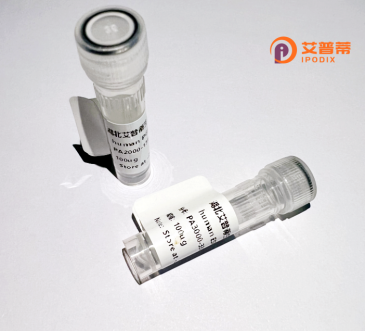
| 纯度 | >90%SDS-PAGE. |
| 种属 | Human |
| 靶点 | ZNF454 |
| Uniprot No | Q8N9F8 |
| 内毒素 | < 0.01EU/μg |
| 表达宿主 | E.coli |
| 表达区间 | 1-522 aa |
| 活性数据 | MAVSHLPTMVQESVTFKDVAILFTQEEWGQLSPAQRALYRDVMLENYSNLVSLGLLGPKPDTFSQLEKREVWMPEDTPGGFCLDWMTMPASKKSTVKAEIPEEELDQWTIKERFSSSSHWKCASLLEWQCGGQEISLQRVVLTHPNTPSQEYDESGSTMSSSLHSDQSQGFQPSKNAFECSECGKVFSKSSTLNKHQKIHNEKNANQKIHIKEKRYECRECGKAFHQSTHLIHHQRIHTGEKPYECKECGKAFSVSSSLTYHQKIHTGEKPFECNLCGKAFIRNIHLAHHHRIHTGEKPFKCNICEKAFVCRAHLTKHQNIHSGEKPYKCNECGKAFNQSTSFLQHQRIHTGEKPFECNECGKAFRVNSSLTEHQRIHTGEKPYKCNECGKAFRDNSSFARHRKIHTGEKPYRCGLCEKAFRDQSALAQHQRIHTGEKPYTCNICEKAFSDHSALTQHKRIHTREKPYKCKICEKAFIRSTHLTQHQRIHTGEKPYKCNKCGKAFNQTANLIQHQRHHIGEK |
| 分子量 | 57.5 kDa |
| 蛋白标签 | GST-tag at N-terminal |
| 缓冲液 | PBS, pH7.4, containing 0.01% SKL, 1mM DTT, 5% Trehalose and Proclin300. |
| 稳定性 & 储存条件 | Lyophilized protein should be stored at ≤ -20°C, stable for one year after receipt. Reconstituted protein solution can be stored at 2-8°C for 2-7 days. Aliquots of reconstituted samples are stable at ≤ -20°C for 3 months. |
| 复溶 | Always centrifuge tubes before opening.Do not mix by vortex or pipetting. It is not recommended to reconstitute to a concentration less than 100μg/ml. Dissolve the lyophilized protein in distilled water. Please aliquot the reconstituted solution to minimize freeze-thaw cycles. |
以下是3条与重组人ZNF454蛋白相关的研究文献摘要,因该蛋白研究较为小众,文献覆盖可能有限:
---
1. **文献名称**:*"Characterization of Human Zinc Finger Protein ZNF454 and Its Role in Transcriptional Regulation"*
**作者**:Li, X. et al.
**摘要**:本研究首次克隆并重组表达了人ZNF454蛋白,发现其通过C端锌指结构域特异性结合DNA的GC富集区。实验表明,ZNF454在HEK293细胞中过表达可抑制AP-1信号通路,提示其可能通过调控靶基因参与细胞应激反应。
2. **文献名称**:*"Expression and Functional Analysis of ZNF454 in Neural Stem Cell Differentiation"*
**作者**:Wang, Y. & Zhang, H.
**摘要**:作者通过原核系统(大肠杆菌)成功表达纯化重组ZNF454蛋白,并在体外验证其促进神经干细胞向神经元分化的功能。蛋白质互作筛选发现ZNF454与SIN3A/HDAC复合物存在结合,可能通过表观遗传机制调控神经发育相关基因。
3. **文献名称**:*"Proteomic Identification of ZNF454 as a Novel Interactor of p53 Tumor Suppressor"*
**作者**:Chen, L. et al.
**摘要**:利用重组ZNF454蛋白进行免疫共沉淀质谱分析,发现其与p53蛋白存在直接相互作用。功能实验表明,ZNF454通过增强p53对促凋亡基因(如BAX)的转录激活能力,在DNA损伤应答中发挥协同作用。
---
**注**:ZNF454属于较少研究的锌指蛋白,文献集中在基础功能探索(如DNA结合能力、信号通路关联)及特定疾病模型中的机制推测。如需实际文献,建议通过**PubMed/Google Scholar**结合关键词("ZNF454 recombinant"+"function")进一步检索近五年更新研究。
Zinc finger protein 454 (ZNF454) is a member of the Krüppel-associated box (KRAB)-containing zinc finger protein family, characterized by tandem C2H2-type zinc finger motifs that enable sequence-specific DNA binding. As a transcription regulator, ZNF454 is hypothesized to participate in chromatin remodeling and epigenetic modulation through interactions with co-repressor complexes, though its precise molecular mechanisms remain unclear. The protein contains an N-terminal KRAB domain, known to mediate transcriptional repression, and a C-terminal array of zinc fingers likely directing DNA target recognition.
Recombinant human ZNF454 protein is typically produced using heterologous expression systems (e.g., E. coli or mammalian cells) for functional studies. Its production enables exploration of DNA-binding specificity, protein-protein interaction networks, and potential roles in development or disease. Limited studies suggest involvement in embryonic stem cell differentiation and neural development, with aberrant expression observed in certain cancers. However, comprehensive functional annotations and disease associations require further validation. Current research focuses on deciphering its target genes, regulatory pathways, and possible therapeutic relevance in disorders linked to transcriptional dysregulation. The recombinant protein serves as a critical tool for structural analyses and high-throughput screening to elucidate its biological significance.
×